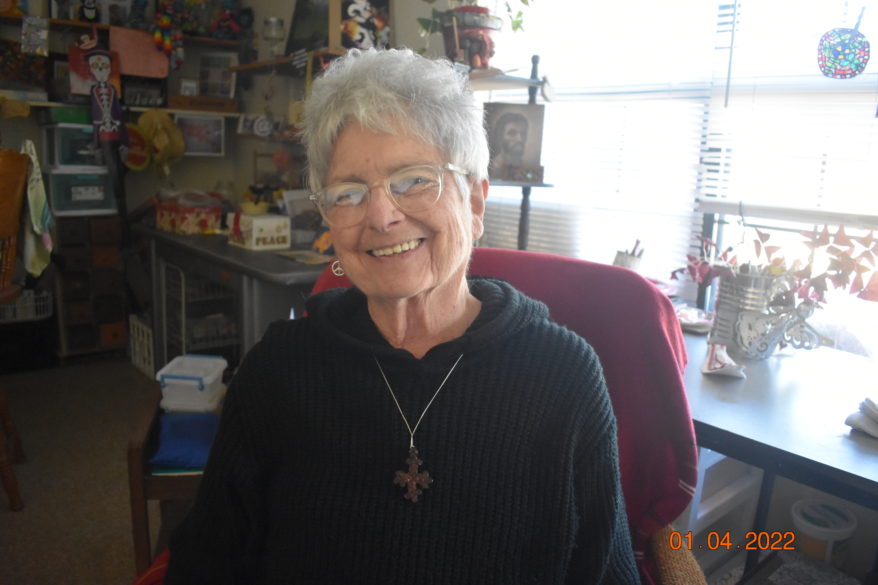FROM THE HERMITAGE
By Sister alies therese
In 1986, Kareem Abdul-Jabbar, the amazing basketball player said, “I try to do the right thing at the right time. They may just be little things, but usually they make the difference between winning and losing.” That’s what he worships.
We just celebrated St. Therese on Oct. 1 (her 150th birthday), the sister of sweet toughness … the manufacturer of ‘little things matter.’ We also celebrated St. Teresa of Avila, who many years earlier, carved out for women a firm line of hope. Whom did they worship?
Everyone worships something … someone. What you worship is important, especially today. What comes first in your life? May I ask? Do you worship food, gaming or TV? Or clothes, cars, dogs or cats? Who worships sex? Or only family or friends? Who worships sports? Who worships lies and ‘fake’ news? Do you worship wealth and money? Or maybe you worship God?

The synod is a practical and historical forum, a place where representatives of this world, broken and at war as it is, might speak in peace and attend to what might seem to be the little things. It also reveals what we worship. Are we no different from the rest of the world … hungry for power, greedy for wealth, selfish? No doubt all these and many more things will be revealed in the rest of this process. Pope Francis said, in the opening synod Mass, “This is the primary task of the synod: to refocus our gaze on God, the be a church that looks mercifully at humanity.”
If I worship so many other things, how can I worship God? Well, the synod is supposed to investigate that and invite us to ‘refocus our gaze.’ If you return to Kareem, Therese or Teresa you might discover their gaze. In their understanding of ‘little things’ (see also St. David of Wales) they focus on the poorest and littlest, mercifully at humanity. They look away from themselves.
Worship and prayer go hand in hand, but worship usually is with others … I may pray alone (and that can be worship too) but usually I worship with others … office, devotions/rosary/chaplet/stations … and certainly Mass. Both prayer and worship take a long gaze and a little practice.
Consider Alice and the Queen …” Alice laughed, ‘there’s no use trying, one can’t believe impossible things.’ ‘I daresay you haven’t had much practice … when I was your age, I always did it for half-an-hour a day. Why, sometimes I’ve believed as many as six things before breakfast,’ said the Queen.” (L. Carroll, Through the Looking Glass). How have you worshipped or prayed before breakfast?
Sometimes prayers in unison get mixed up. For example, Dr. Clifford at a Methodist church in Texas, “We find our world a clod and cheerless place without Your love.” Or in the church bulletin prayer at the Congregational United in Missouri, “O Loving God, who reaches out to restore our soles, touch us now with Your word of truth…”
Or maybe it is actually perfection we worship … that we search for … that we value?
I like Marilyn Meberg’s insights, “my intent in life is to remind you that nothing in life is perfect … if we can accept that, we can quit looking for it, blaming ourselves or others, … and even come to a place of peace. That gives me the energy to settle down to a platter of pasta that is a trifle overdone with a touch of too little garlic – and not lose my joy!” (Bolton, Heavenly Humor for the Woman’s Soul, Barbour, 2008)
How have you refocused your gaze on God? What things do you worship that you need to let go of in order to put Jesus first? How has your worship of such an awesome God brought you joy?
Consider this with Thoms A. Kempis (1380-1471): “O everlasting Light, surpassing all created luminaries, flash forth Thy lightning from above, piercing all the most inward parts of my heart. Make clean, make glad, make bright and make alive my spirit, with all the powers thereof, that I may cleave unto Thee in ecstasies of joy.”
Let’s uplift our communal worship and fill our private prayer with joy.
BLESSINGS.
(Sister alies therese is a canonically vowed hermit with days formed around prayer and writing.)
